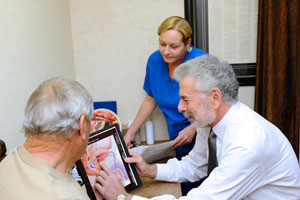 Texas Urology Update for PCP's Texas Urology Update for PCP's
"Tis the Season" for Stones - About Treatment
1. The initial form of treatment is medical expulsion therapy (MET). Numerous studies have shown that alpha blockers (Off Label) can promote the passage of stones via the relaxation of the smooth muscle of the ureter. The alpha blockers can be given to either males or females, although you must warn the women that if they look on-line they will think you are treating them for a prostate problem. Additionally, if one is going to use Flomax or Rapaflo, one should warn the patient about the potential for retrograde ejaculation, but tell them not to panic, as that it is temporary.
2. Obviously, all patients should strain their urine since stones won't necessarily cause pain on their way out from the bladder. They can purchase paint strainers at one of the hardware stores or use coffee filters, if necessary. I find the paint strainers are actually quite nice since they are inexpensive and can be used once and discarded.
3. Antibiotic should not be given routinely unless there is a strong possibility of urinary tract infection (Nitrate positive and leukotrace positive. You can check the dip-stick urine for that). 
4. A urine culture should be obtained as well as a serum creatinine on patients with stones.
5. One of the mainstays is po narcotics of the hydrocodone family. If, indeed, the hydrocodone doesn't take care of it, it is rare that going to a stronger opiate will be of benefit.
6. IM Toradol works quite well for controlling the vast majority of patients with renal colic in the urologic office setting. For some patients, you may even feel comfortable giving them a prescription to do their own Depo injections. The dose is typically 30 mg. and may be repeated once in a 24 hr. period. There is a nasal Toradol, Sprix, which is also available and does a fairly good job of controlling severe colic. It is important for the patients to know that they should not inhale the medication into the lungs as it can cause significant burning. Rather, they should take a deep breath and hold their breath and then spray the medication laterally in each nostril. Maximum dose is two sprays four times a day.
Indication for Intervention
1. Fever along with a stone is potentially a life-threatening emergency and requires immediate urologic consultation. It is not impossible for a patient with a fever and a stone to get septic very quickly. This is a special concern, obviously, in diabetic patients and also those who are immuno-compromised.
2. Persistent pain or if the patient is tired of the pain.
3. Nausea and vomiting.
4. Persistent elevation of renal functions.
Intervention Options
1. Medical Expulsion Therapy.
2. Electric Shock Wave Lithotripsy (ESWL). Success with lithotripsy depends on the size of the patient, the size of the stone, the location of the stone, the Hounsfield units (density of the stone) and the type of stone. On a cat scan, the radiologist can measure the Hounsfield Units. Studies show Hounsfield Units greater than 1000 are less likely to be successful with lithotripsy. There is a limit of approximately 2500 to 3000 shocks that can be given in the kidney, however, one can easily go up to 4000 or more shocks at a higher voltage for stones that are in the ureter blow the kidney.
3. Ureteroscopy. This is where following cystoscopy, a smaller telescope (ureteroscope) is passed up into the ureter, a laser used to fragment the stone into pieces and then the pieces are removed. The vast majority of the time, a ureteral stent is placed afterwards which is a small coiled tube between the kidney and bladder typically with a piece of string on the distal end that comes out to the meatus or just short of the meatus. Stents are no fun. Patients often have frequency, urgency, and pain with urination in the kidney, bladder spasms, and gross blood in the urine.
4. Open Ureterolithotomy. This is almost never done; in fact, most operating rooms don't even have preference cards for urologists for this procedure.
When to Refer
Please remember to send the patient with films and any pertinent lab tests.
1. Fever (immediate urological referral).
2. Urinary tract infection associated with a stone.
3. Persistent pain.
4. If the patient desires intervention.
5. Medical management and follow-up of the patient.
6. Additional stones in the kidney.
Stone Formation Workup
Typically, stone formation workup is done with a 24 hr. urine and stone analysis. One does not do the 24 hr. urine until the patient is back in their regular dietary and fluid intake routine. The most common cause of a stone is decreased fluid intake followed by elevated urine calcium or low urinary citrate. Recent studies have shown, by the way, that Topomax will reduce the urinary citrate.
As always if you have any questions, don't hesitate to contact us at 972-420-8500.
Quick navigation links:
What is a Urology Center | Urologist | Urology Conditions | Urology Services | Resources for Health | Contact Urology Center in North Texas | Sitemap | Home
Disclaimer:
The pictures displayed in www.TexasUrology.com are images of actual patients and employees who have consented to have their picture in this website.

Website Design & Educational Content © Copyright 2023 MedIngenuity, LLC
Medingenuity develops content-rich educational web sites for urologists and urology group practices.
|